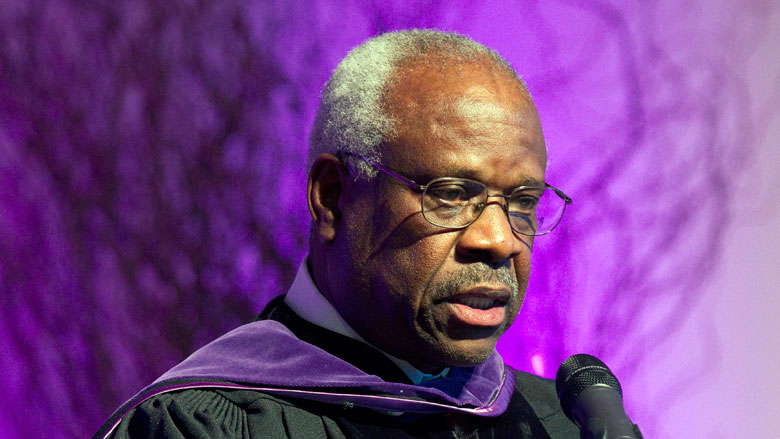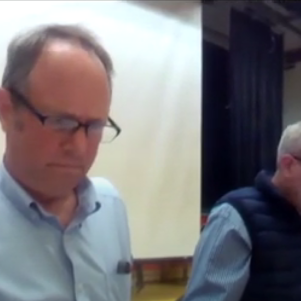Smithsonian now mentions Clarence Thomas, but only in Anita Hill footnote
By Penny Starr | November 12, 2016, 16:17 EST
 Supreme Court Justice Clarence Thomas speaks at College of the Holy Cross in Worcester, Mass. (AP Photo/Michael Dwyer, File)
Supreme Court Justice Clarence Thomas speaks at College of the Holy Cross in Worcester, Mass. (AP Photo/Michael Dwyer, File) (CNSNews.com) – In response to a letter from lawmakers demanding to know why Supreme Court Justice Clarence Thomas is not included in the new National Museum of African American History and Culture, the Smithsonian responded that it has added a caption to Anita Hill’s representation in the museum.
The caption reads: “Anita Hill accused a nominee to the U.S. Supreme Court, Clarence Thomas, of sexual harassment. Her testimony before the Senate Judiciary Committee provoked serious debates on sexual harassment, race loyalty, and gender roles. Thomas denied the allegations and went on to be confirmed by the Senate, becoming the second African American to serve on the Supreme Court.”
Mary Carpenter, communications director for Rep. Buddy Carter (D-Ga.), who spearheaded the letter to Smithsonian Secretary David Skorton, told CNSNews.com that Carter finds the response unacceptable.
“The Smithsonian has not indicated that they will do more, but Congressman Carter is continuing to look for ways to work with curators to find an appropriate way to include Justice Thomas’ remarkable story,” Carpenter said.
“Justice Thomas’ tremendous judicial achievements deserve to be included in the Museum of African American History and Culture, and not just as a footnote next to Anita Hill,” Rep. Dave Brat (R-Va.), who also signed the letter, told CNSNews.com. “It is an outrage that his story of triumph over adversity has not been included in a substantive way.”
“This is a great example of elitist political correctness,” Brat added. “How is it that the second African American appointed to the Supreme Court was somehow not honored in this museum?”
As reported earlier by CNSNews.com, when asked why Thomas was not included in the new museum, Linda St. Thomas, chief spokesperson for the Smithsonian, replied, “There are many compelling personal stories about African Americans who have become successful in various fields, and, obviously, Associate Justice Thomas is one of them.”
“However, we cannot tell every story in our inaugural exhibitions. We will continue to collect and interpret the breadth of the African American experience,” she said.
In a Nov. 3 letter to Skorton, Carter and 16 colleagues raised concern about the omission.
“Excluding Justice Thomas’ story from this institution denies its visitors an important representation of overcoming adversity to reach great heights,” it said. “Justice Thomas’ exclusion from the new museum has led some to draw conclusions of a political bias in the curation of an institution that should be above reproach.”
“With this in mind, we insist that you provide an explanation about the conspicuous absence of Supreme Court Justice Clarence Thomas from the new museum, and of any future plans to feature him in a permanent exhibit.”
Carter told CNSNews.com he was “shocked” to learn of the omission.
“His background and accomplishments are more than worthy of inclusion in the museum and it’s a disservice to history to exclude him,” he said.
“Beyond denying visitors the opportunity to learn about Justice Thomas’ unique story, a partisan shadow has now been cast on the opening of a much anticipated and long overdue addition to our National Mall,” Carter said. “I am hoping to work with curators to find an appropriate way to include Justice Thomas, but the current omission is simply unacceptable.”
Rep. Joe Pitts (R-Pa.) told CNSNews.com that Thomas was “one of the foremost African American leaders in the country and it is wrong to just ignore his huge role in shaping American law.”
The other House members who signed the letter were Reps. Joe Barton (R-Texas), John Duncan (R-Tenn.), Steve King (R-Iowa), Louie Gohmert (R-Texas), Lynn Westmoreland (R-Ga.), Mo Brooks (R-Ala.), Tim Huelskamp,(R-Kan.), Austin Scott (R-Ga.) Mark Meadows (R-N.C.), Jason Smith (R-Mo.), Rick Allen (R-Ga.), Brian Babin (R-Texas), Jody Hice (R-Ga.), and Barry Loudermilk (R-Ga.)
Thomas was born and raised in the small town of Pin Point, Georgia.










